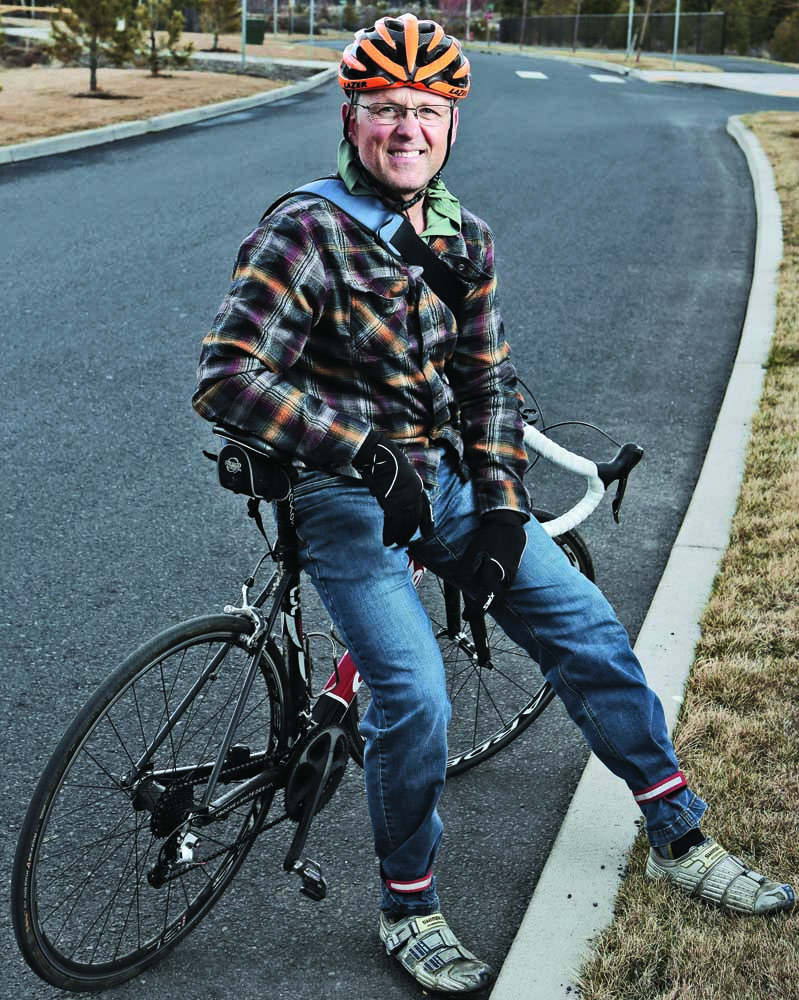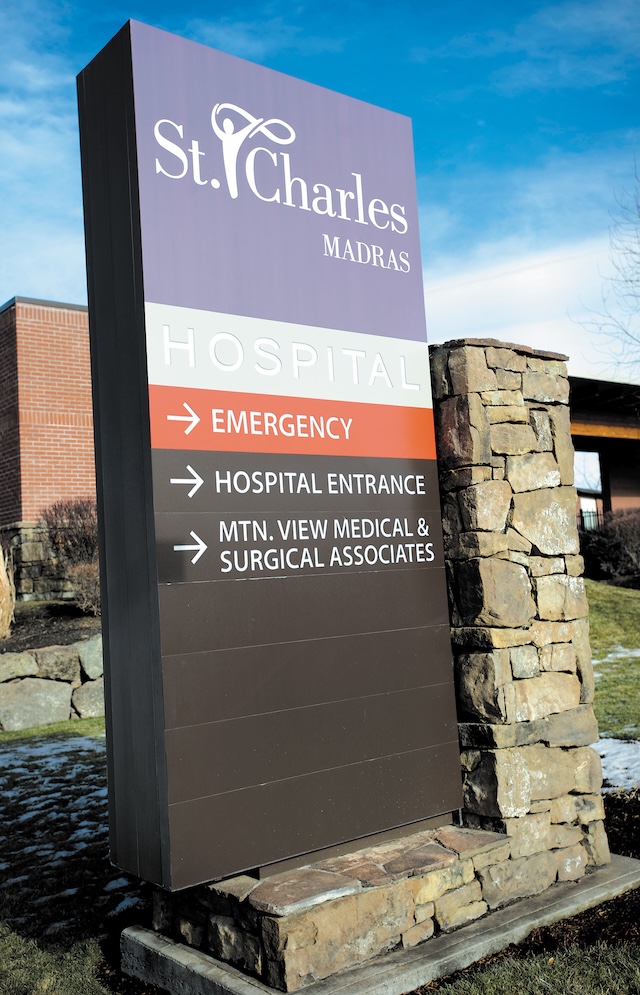Chuck Kenlan takes over OBRA amid shifting cycling landscape
Published 12:00 am Monday, April 9, 2018

- New OBRA director Chuck Kenlan sits on his bike along the course where the OBRA criterium championship races are held on Tuesday, April 3, 2018, in Bend. (Joe Kline/Bulletin photo)
Name any role at a cycling race, and Chuck Kenlan has likely filled it. He has been a race promoter and a race official, a rookie competitor and the husband cheering on the sidelines.
So when the former Mt. Bachelor Sports Education Foundation director learned that the Oregon Bicycle Racing Association was in need of a new executive director, Kenlan couldn’t help but notice that OBRA was looking for a leader who sounded a lot like him.
Trending
“It’s pretty rare that you can look at a job description and check all the boxes on the job description,” Kenlan, 55, said in a recent interview. “We want to do things that we’re good at, and for me, it just seemed like the perfect fit.”
OBRA is the sanctioning body for Oregon cycling races and fulfills a number of administrative roles, such as providing race officials, equipment for race days and liability insurance. Races are conducted according to the OBRA rule book, and the organization’s website can serve as a hub for race promotion, registration and posting results. But Kenlan said the most important roles of OBRA, in his mind, are to increase participation in Oregon races and support the local cycling community.
OBRA currently counts more than 3,600 members and 50 officials, but Kenlan said participation, particularly in road races, has dipped in recent years, both in Oregon and across the country.
“Cycling itself is growing — it’s a growing sport — but bike racing is flat, the memberships have declined a bit over the years,” Kenlan said. “OBRA, along with cycling across the country, was on a huge upward trajectory when Lance Armstrong was winning all the Tour de Frances. Everybody had a national hero. They thought, gosh, I want to be involved and race my bike. And so it saw tremendous growth there. And since his retirement and fall from grace, those numbers have flattened out and interest declined.”
Most of Kenlan’s professional career has centered on sports and the outdoors. He grew up in Washington and attended Washington State University before moving to Central Oregon in 1988 to take a job in the marketing department at Mt. Bachelor ski area. He worked in several different positions at Mt. Bachelor, eventually taking over as manager of the nordic center before becoming MBSEF executive director in 2002.
Kenlan said he was familiar with the competitive cycling world because of his wife, Karen Kenlan, and her racing career, but he first started working with OBRA during his time at MBSEF.
Trending
“In 2004 we negotiated a transfer of the Cascade Cycling Classic to MBSEF as a fundraising event, and so I was involved in promoting the Cascade Cycling Classic until I left in 2011,” Kenlan said, referring to the annual pro (and, at the time, amateur) stage race held in Central Oregon each summer. “That was where I was essentially introduced to what OBRA does. At the time, the amateur races were allowed to be sanctioned by OBRA, so I got to see what the OBRA officials did and how that worked and what it cost us to pay for them.”
Within a few years, Kenlan and a few other locals trained to become race officials so that Portland-area residents would not have to travel to Bend for each Central Oregon race. Soon after that, Kenlan decided to join in the fun and race occasionally himself.
“At the time, when I was racing, there were all these fun local bike races to do, and they went away for a few years,” said Kenlan. “The people that put them on, it just wasn’t worth their time to do it. So one of the guys I raced with and I started our little company, called TFG Racing. And so this is going to be our fourth year promoting races in Bend.”
Kenlan left MBSEF in 2011 to work in the mortgage industry and earn an MBA. Kenlan has also worked on and off as a fly-fishing guide for more than 20 years, and he now runs a company called Super Hackle LLC, which is developing a new material to be used in the fly-fishing industry. He left the mortgage industry after two years, and he and his partner at TFG Racing, Matthew Lasala, organize races like the Bust Your Butte Gravel Challenge, Sagebrush Cycles Time Trial Series and High Desert Omnium.
“I think you could say, well, Chuck’s never officiated a track race in a Velodrome,” OBRA board member Michelle Mercer joked. “But he’s been a racer himself, he’s been a volunteer, he’s been a race promoter, which is a very difficult job. He’s been an official, so he knows the OBRA rule book inside and out. He has such a depth of experience with Oregon bike racing and national bike racing since he’s working on big events like the Cascade Cycling Classic.”
Mercer, the lone Bend resident on the OBRA board, said the organization received many applications for the executive director position last fall, when Kenji Sugahara announced he would be stepping down after nearly a decade in the role.
“Just like Kenji devoted 10 years, we wanted another person who would step in and be able to devote another decade,” Mercer said. “We really wanted someone to come on board and take a really strong leadership role, because it is a nonprofit, and it does have a volunteer board. We do have a small staff, but it’s a part-time staff. And so someone who really is adept at working well with people and galvanizing support and keeping people engaged with a diverse team.”
Both Kenlan and Mercer said they see OBRA as a grassroots organization that is more connected to individual members than larger sanctioning bodies such as USA Cycling. Still, Kenlan said one of his goals as director is finding ways to add value to an OBRA membership, in the hopes that more cyclists would be enticed to join the organization. He is also focused on attracting larger sponsors to the organization.
“OBRA can turn around and take that money and subsidize the promoters that put on state championship events,” Kenlan explained. “Because you have to have so many categories, for every age group and sex, they are very costly to promote. By attracting some higher-dollar, bigger-name sponsors that would sponsor OBRA, that money could go back to the promoters. And it would be really exciting to see six different race promoters bidding on the same race every year.”
Kenlan said he hopes to see OBRA grow to the point where it requires a formal office and a few full-time employees. But for that to happen, the organization will have to continue adapting to new cycling landscape.
“There’s a lot of competition for people’s time and their resources — there are just a lot of fun things to do out there. So how do we appeal and how do we stay relevant as cycling is changing and evolving?” Mercer said. “We’re seeing this huge, explosive growth with cyclocross as a discipline, and less emphasis on road. So how do we adapt? And maybe, how do we even adapt road cycling to maybe not be as traditional as it used to be and be more inclusive?”
Kenlan said he sees the thriving youth cycling scene, driven by organizations like MBSEF, Bend Endurance Academy and Portland-based PDX Devo, as a sign that cycling racing can adapt in the way Mercer described.
“The really exciting thing about OBRA right now is the growth of junior cycling in the state. That’s going to be the lifeblood of our sport moving forward,” Kenlan said. “The specific growth in junior racing in Oregon is in the sport of cyclocross. So really, it’s trying to provide promoters platforms or easier for them to have more junior races in the other disciplines, in road racing and some of the others. Putting on a bike race is really expensive, and you need the numbers to justify that. But it’s exciting to see the growth in juniors and what these organizations are doing to encourage kids to get out on their bikes, and the value of competition and what competition does for someone young. So that’s exciting.”
—Reporter: 541-383-0305, vjacobsen@bendbulletin.com








